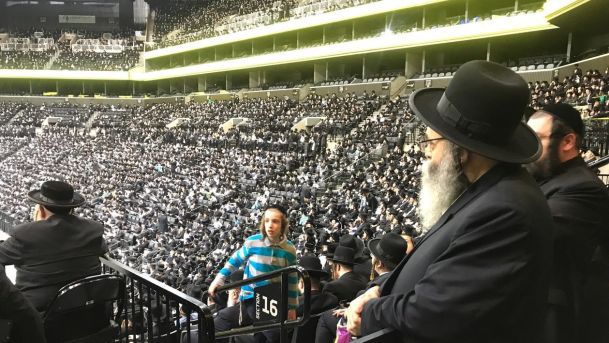
On June 11, 2017, nearly 20,000 ultra-Orthodox Hassidic men and boys gathered at Barclay’s Stadium in Brooklyn. A demonstration condemning the Israeli Government’s enforcement of laws requiring young Hassidic men there to enlist in the Israel defense Forces, the event was populated mostly by anti-Zionist, Satmar Hassidic Jews. This event, conducted primarily in Yiddish, is part of long-standing tensions between certain ultra-orthodox communities in the US and Israel and the Israeli government. Theology and law lie at the center of these conflicts.
The Satmars, along with other Haredi groups, dating back to the establishment of Zionism, have been outspokenly opposed to a Jewish state in the Land of Israel. Holding the belief that a Jewish state cannot legitimately exist until the arrival of the Messiah, these groups, despite having a significant demographic presence in Israel today, are in constant tension with the Israeli government over numerous issues relating to state power. One of the most public and symbolic of these is the struggle for military exemptions for Haredi Yeshiva students, a legal process which began in 1982 with a series of petitions from the Haredi community in Israel.
While service in the Israeli Army is mandatory for all Israeli citizens at the age of 18, there had been in place a temporary series of exemptions to conscription for Orthodox-Israeli Yeshiva students. Seen as an interim solution to the longstanding issue, the Tal Law, based on the recommendations of the Tal Commission, in 2002 stipulated that Yeshiva students, at the age of 22, could choose between a year of unpaid, non-military national service, or a 16-month reduced term of Military service following their religious studies. The Law, which was ruled as unconstitutional and subsequently revoked in 2012, ultimately resulted in minimal conscription of ultra-orthodox Israelis, even within its lenient framework. In 2012, then Defense Minister Ehud Barak supported repealing the Tal Law, stating “…after 10 years, [the Tal Law] did not meet expectations, nor did it lead to the required changes … concerning equally sharing the burden.”
Since 2012, the Israeli government has been increasingly enforcing mandatory conscription for young Haredi men. The Israel Defense Forces have in fact created specific units in the army designed to help prepare this unique group to become soldiers. In 2016, around 3,200 Haredi men enlisted into the IDF, an increase of 500 from 2015. Despite these modestly growing numbers, the Haredi soldiers often face ridicule and abuses in their communities, further exacerbating pre-existing tensions and social barriers preventing an even larger increase in conscription. While a slowly growing minority in this community sees Israeli military service as a means of achieving upward mobility and escaping the rampant poverty associated with the Haredi neighborhoods in Israel, this is not a widespread phenomenon.
The issue of mandatory military service for Haredi men, despite being just one matter surrounding the tensions between the ulta-orthodox and the state of Israel, has become front and center in the associated public discourse. Despite many Haredis in Israel and the US not acknowledging the legitimacy of Israel or its government, this community is a part of the state, and accordingly will need to figure out some way of reconciling their theology with Israeli citizenship and its associated civic responsibilities.
For further reading:
